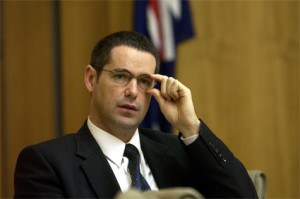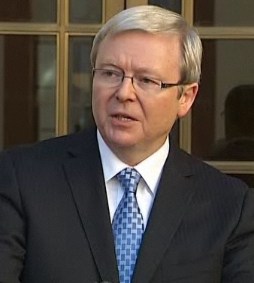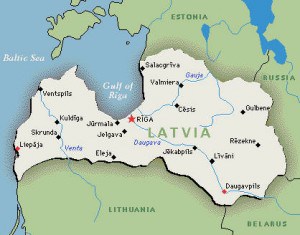
Sen. David Hoyle (D-NC)
Retiring North Carolina state senator David Hoyle wants to save North Carolina cities from themselves. Proclaiming that “cities are getting into the broadband business with little or no experience and competing with private enterprise who pay the taxes,” Hoyle continues his push to put a stop to municipal broadband projects in North Carolina.
A week after Hoyle and a few allies on the Revenue Laws Study Committee pushed forward a draft bill that would require public referendums that could be triggered even when making basic repairs to community-owned fiber networks, IndyWeek reports Hoyle doesn’t exactly come to the debate with clean hands.
Rebekah Cowell, in a piece called “Hoyle to municipal broadband: Drop Dead,” notes Time Warner Cable’s PAC contributed $6,000 to Hoyle’s final campaign in 2009.
Hoyle told Cowell he is not swayed by Time Warner Cable’s deep involvement in pushing the legislation forward, despite the generous contribution to his campaign coffers.
“The lobbyists don’t influence me,” he said. “I’m in the pocket of the people that provide jobs for this state, and Time Warner Cable employs 8,500 in this state, and I can’t imagine any one that would want to compete with that.”
Time Warner Cable told IndyWeek it doesn’t philosophically oppose municipal broadband projects, and claims Hoyle’s bill would only apply to a city that chooses to take taxpayer money to build a competing network as if it were a private provider. “We just believe that they should have to operate under the same rules as the private provider,”  Melissa Buscher, director of media relations at Time Warner Cable told Cowell. “We do believe people in the community should have a say-so in how large amounts of public monies are spent.”
Melissa Buscher, director of media relations at Time Warner Cable told Cowell. “We do believe people in the community should have a say-so in how large amounts of public monies are spent.”

Buscher
Yet the legislation proposed by Hoyle actually impacts projects that receive no public taxpayer dollars. Under his proposal, any municipal project seeking private bondholders has to endure an endless series of referendums on everything from initial system approval, construction, refinancing debt, extending service, upgrading the network, and even when basic system repairs are needed.
Time Warner Cable’s concern for public tax dollars only seems to extend to their potential competitors. The cable operator itself gratefully accepted public tax dollars from the state Department of Commerce, the city of Charlotte, and the county of Mecklenburg to construct a $29 million dollar headquarters building in Charlotte. Even in smaller communities, the cable operator enjoyed benefits from taxpayers who didn’t have a “say-so in how public monies are spent.” In December, Marble Cliff Village Council approved an economic development agreement with Time Warner Communications including a five-year tax abatement worth $100,000.
North Carolina’s phone companies also benefit from state taxpayers. As IndyWeek reports:
A 2009 analysis by Democracy North Carolina [shows] two telecommunications companies, AT&T and Embarq, both benefited from tax breaks on the purchases of telephone equipment that costs the state an estimated $31 million annually in lost revenue. In 2008, political action committees for AT&T and Embarq contributed $140,500 and $151,250, respectively, to legislative candidates, statewide candidates and party committees.
Hoyle apparently has no problem with losing that tax revenue.
Hoyle’s claims that municipal broadband projects hurt North Carolina consumers are untrue in cities like Wilson, the only community in North Carolina that successfully avoided a Time Warner Cable rate increase this year.
Time Warner customers in Wilson are benefiting from Greenlight’s competition. According to a December 2009 presentation before the House Select Committee on High Speed Internet Access in Rural and Urban Areas, Time Warner raised its prices for basic service in the Triangle—as much as 52 percent in Cary—but did not impose any rate hike in Wilson. Nor did the company increase prices in Wilson for the digital sports and games tier, while Triangle customers paid 41 percent more.
Cable and broadband consultant Catharine Rice of Action Audits gave the presentation; she advocates for municipalities that want to build their own networks.
The bill could hurt Wilson’s Greenlight service, even though it’s been installed. “The way the legislation is worded, and how I interpret it,” says Ovittore, “is that if the city of Wilson … had a resident who was digging in their yard—let’s say putting a new mailbox in—and accidentally damaged a strand of fiber, before that strand could be repaired the city would have to go through a referendum and vote, spending endless taxpayer dollars.”
A public referendum could also be required if Wilson wanted to connect an additional household to their existing system, Ovittore said.
Hoyle says that of the $30 million to build the network, Wilson used $12 million of it from the utility account. “People there are raising hell about their electricity bill, and it’s just not right,” he said.
Brian Bowman, Wilson’s public affairs manager, said the city borrowed the $28 million on the private market. As for Hoyle’s $12 million figure, Bowman said, much less—only $3.6 million— had been set aside from the electric fund by City Council in 1989; it was re-designated in 1999. “It has always been part of our funding package,” he said. As for the electric bills, Bowman said they were higher earlier this year because of the particularly cold winter, not the cost of the network.
Wilson accomplished its municipal broadband system without spending a nickle of taxpayer money. Other North Carolina communities considering similar projects would run into overwhelming problems overcoming Hoyle’s telecom-friendly legislation because of its referendum requirements.
Hoyle told IndyWeek he doesn’t see the need for such projects anyway, claiming fast broadband is already universally available across the state.
“I’ve heard that BS, and it’s just not true—period,” he said. “Anybody that needs service has got served in this state and will continue to get served.”
Hoyle’s words sound a lot like those of Time Warner Cable, which also contends broadband availability is not an issue. “Based on a map of the state done in 2009 by Connected Nation, more than 92 percent of homes in North Carolina have broadband available to them,” said Buscher. “A vast majority of those have two wireline providers, some have wireless providers, plus satellite offers broadband to literally every home in the state. This isn’t an availability issue. Anyone who wants Internet service can get it today.”
Those claims are dubious. Chatham County Commissioner Tom Vanderbeck has advocated for rural broadband access since 2006 in an area where pockets still have only dial-up and DSL. Vanderbeck was recently appointed by the General Assembly to serve on the e-NC Authority, which promotes statewide rural broadband. He calls Hoyle’s bill anti-competitive, one that would discriminate against local government.
[…]
“Requiring a vote, when you have deep pockets that can fight it and put up as much money as they want, while making the project sound like a waste of taxpayer dollars—that would be a tragedy,” she adds.
Anyone who proclaims satellite fraudband represents a credible broadband competing alternative should be forced to use it.
Connected Nation, which Buscher relies on for her numbers, has a board dominated by telecommunications company executives, particularly AT&T. With their private provider-stacked leadership, they can draw the maps anyway they please, particularly in ways that suggest there isn’t a broadband problem in North Carolina… or anywhere else. Not as long as they are running it.
 Australia’s current Labor government has refused to compromise on its goal of delivering super-fast broadband service to nearly every Australian, declaring they will get the job done no matter what it takes.
Australia’s current Labor government has refused to compromise on its goal of delivering super-fast broadband service to nearly every Australian, declaring they will get the job done no matter what it takes.

 Subscribe
Subscribe







 Melissa Buscher, director of media relations at Time Warner Cable told Cowell. “We do believe people in the community should have a say-so in how large amounts of public monies are spent.”
Melissa Buscher, director of media relations at Time Warner Cable told Cowell. “We do believe people in the community should have a say-so in how large amounts of public monies are spent.”
